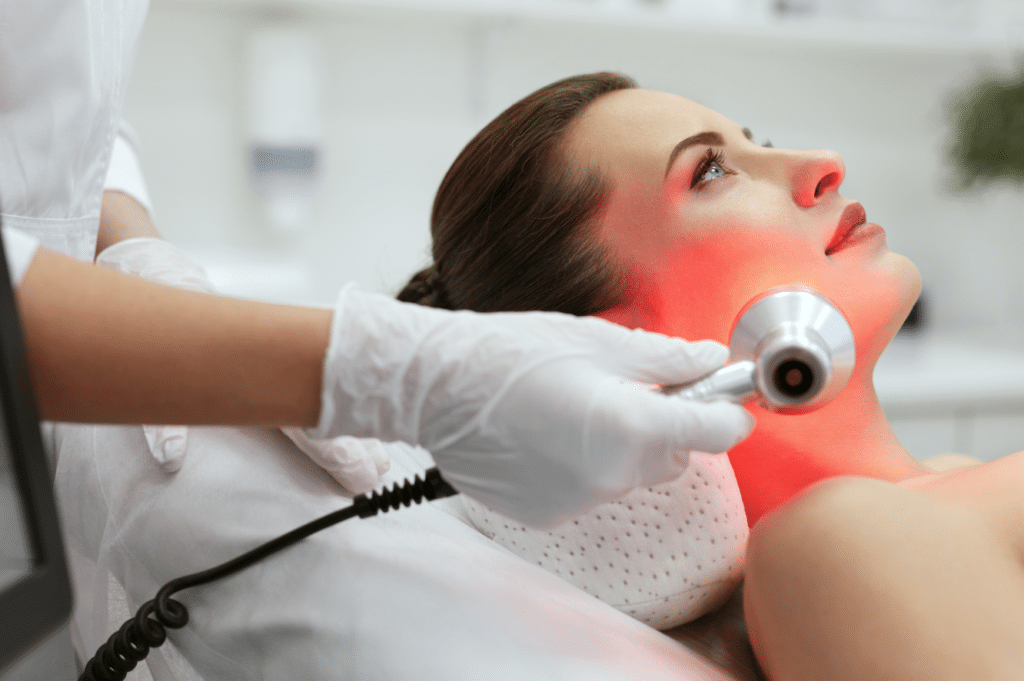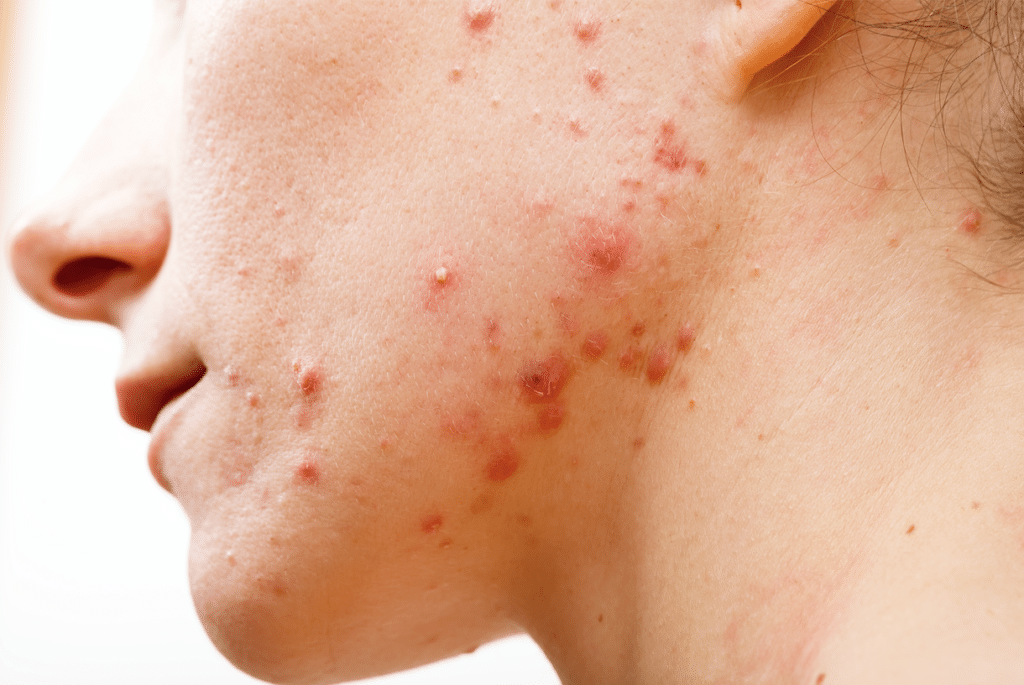
LED light therapy was first recognized by NASA, but it is now available to the public in a variety of devices, ranging from small pens to full beds. The uses range from wound healing to reducing cellulite to treating anxiety and depression. Red light therapy’s ability to reduce inflammation make it a powerful tool to help treat acne 1.
The Basics of Red Light Therapy
Red light and near-infrared (NIR) light therapy involve using different net wavelengths of light in the 660 nm to 890 nm range, a portion of the light spectrum that is considered “bioactive.” The treatment is given by either low-level lasers or LED lights (light-emitting diodes).
Science has shown that it strengthens the mitochondria. A cell’s energy is created in the mitochondria as adenosine triphosphate (ATP). Greater ATP production gives more energy to the cell and helps it function better and repair damage 2.
Red light therapy doesn’t damage the skin’s surface, which is different from laser or intense pulsed light (IPL) therapy. Laser and IPL work by administering only minor damage to the outer layer of skin, which signals tissue repair. Red light therapy penetrates only about 5 millimeters into the skin, which also stimulates cell regeneration 3. I go into more detail here on how red light therapy works.
Health Benefits of Red Light Therapy
It has been proven effective for many health-related issues which include:
- Wound healing
- Fibromyalgia and chronic fatigue
- Hashimoto’s hypothyroidism
- Increased bone healing
- Improved eye health
- Anxiety and depression
- Improved mental performance
- Tendonitis
- Increased fertility
- Arthritis and joint health
- Improved immune system function
- Improved quality of sleep
- Brain health
- Weight loss
An Overview of the Benefits for the Skin
Thousands of studies have been done since the 1990s on various health benefits of red light therapy. While the positive effects range from healing wounds to treating anxiety and depression, some of the most explored uses are for the skin. Dr. Hamblin and I dive into the specifics and research in the podcast, “The Science on Red Light Therapy Benefits.”
Collagen and Elastin Production
Skin aging is a result of decreased collagen production and a rise in matrix metalloproteinase (MMP) expression. Studies have shown that red light therapy reverses both of these 4.
Natural Anti-Inflammatory
Chronic inflammation is identified as a major contributor to many chronic diseases. Studies have shown that red and near-infrared light therapy works just as well for anti-inflammation as routinely prescribed non-steroidal anti-inflammatory drugs (NSAIDs) 5.
Reducing Fine Lines and Wrinkles
One of the main reasons red light therapy has gained popularity is because of its ability to reduce wrinkles, fine lines, sun spots, discoloration, and other signs of aging skin. New York City-based aesthetician Joanna Vargas notes, “Your complexion will be more lifted, toned, and improved – resulting in younger-looking, smoother skin by increasing healthy cellular activity.”
The Causes of Acne
Acne is the most common skin condition in the United States, affecting up to 50 million Americans every year. Acne is a chronic, inflammatory skin condition that causes spots and pimples, usually on the face, back, and shoulders.
Medical News Today provides these fast facts about acne 6:
- Acne is a skin disease involving the oil glands at the base of hair follicles.
- It affects 3 in every 4 people aged 11 to 30 years.
- It is not dangerous, but it can leave skin scars.
- Treatment depends on how severe and persistent it is.
- Risk factors include genetics, the menstrual cycle, anxiety and stress, hot and humid climates, using oil-based makeup, and squeezing pimples.

Our skin contains pores that connect to oil glands under the skin. Follicles, or small sacs that produce oil, connect the glands to the pores. The glands produce an oil called sebum, which carries dead cells through the follicles to the surface of the skin. A small hair grows through the follicle out of the skin.
Acne occurs when the skin follicles are blocked and oil builds up under the skin. Skin cells, oil, and hair can clump together and form a plug. If the plug gets infected, swelling occurs. When the plug begins to break down, a pimple forms.
Red Light Therapy and Acne
Red light therapy is great at improving circulation, which increases the flow of oxygen and nutrient-rich blood to the cells. This increase in circulation causes a boost in lymphatic drainage, which is the way the body clears away toxins that cause pimples.
Inflammation
The main benefit of red light therapy for acne is that it reduces inflammation, which means it decreases painful swelling and spot size 7.
Acne Pimples
Reduced inflammation decreases the size and appearance of pimples. Also, the pain associated with pimples is reduced by decreased inflammation.
Hormonal acne is generally caused by a sensitivity to hormones, usually during pregnancy or before periods. Red light therapy reduces the swelling and pain of hormonal acne and speeds up recovery. It can also make the skin less sensitive to hormones over time preventing future breakouts 8.
Acne Scars
Red light therapy increases collagen production, which helps prevent scarring and reduces the appearance of existing scars.
Red Light Therapy Devices for Acne
There are many red light therapy devices on the market, from small spot treatments to panels to full body beds. A few that are meant specifically for acne treatments:
Neutrogena Light Therapy Acne Spot Treatment
This handy portable pen uses red and blue lights to target pimples and blemishes by killing acne-causing bacteria and reducing swelling.
LightStim for Acne LED Light Therapy Device
LightStim for Acne uses blue light to destroy bacteria and red light to reduce swelling without drying your skin. Treatments are only three minutes and do not have any recovery time.
Acne Light Therapy Mask
Acne light therapy masks are best for treating acne on the the face and smoothing wrinkles and fine lines. Masks are a one size fits all shape, but they are specially designed to contour your face which allows for even coverage. Many also have built-in eye protection.
Is Red Light Therapy Right for You?
Everyone’s skin is different and results can vary based on the level and type of acne being treated. Overall, red light and NIR light therapy have many benefits for one’s health, including:
- 100% natural
- drug-free
- chemical-free
- no needles or knives
- does not damage the skin
- painless, does not itch, burn or sting
- safe for all ages
- no negative short or long term side effects
- FDA approved
The National Institute of Health completed a study titled, “A Controlled Trial to Determine the Efficacy of Red and Near-Infrared Light Treatment in Patient Satisfaction, Reduction of Fine Lines, Wrinkles, Skin Roughness, and Intradermal Collagen Density Increase”. The results of the study were:
“The treated subjects experienced significantly improved skin complexion and skin feeling, profilometrically assessed skin roughness, and ultrasonographically measured collagen density. The blinded clinical evaluation of photographs confirmed significant improvement in the intervention groups compared with the control.”
With the increasing number of devices available for at-home use, the benefits of red light therapy are now available to more people than ever.
“I think interest in light therapy is definitely increasing,” says Michael Hamblin, PhD, an associate professor of dermatology at Harvard Medical School. “Instead of trekking to the doctor’s office to have light shined on them, consumers can now shine light on themselves at home. The light is basically the same, there are few safety issues, and it is a fraction of the cost.”
The many health benefits continue to be studied, including the effects on bone health, eye health, mental and cognitive functions, pain relief, fertility, wound healing, anxiety, depression, weight loss, and many more. Red light therapy’s ability to reduce inflammation while stimulating the production of collagen makes it a great tool for combating acne, reducing swelling, and minimizing scarring in a quick and easy way 9.
If you want to give red light therapy a try in the comfort of your own home, you can check out my ” How to Use Red Light Therapy” guide here.
References[+]
| ↑1 | Freitas de Freitas et al. (2016) Proposed Mechanisms of Photobiomodulation or Low Level Light Therapy |
|---|---|
| ↑2 | Hamblin, M, et al. (2018). Low-level light therapy: Photobiomodulation. Society of Photo-Optical Instrumentation Engineers (SPIE) |
| ↑3 | Câmara AB, et al. (2018). Sunlight Incidence, Vitamin D Deficiency, and Alzheimer’s Disease. J Med Food. 2018 Mar 22. doi: 10.1089/jmf.2017.0130 |
| ↑4 | Sorenson, M, (2016). New Research Sheds More Light on Parkinson’s Disease Sunlight Institute |
| ↑5 | Wang, J, et al. (2016). Vitamin D and Sunlight Exposure in Newly-Diagnosed Parkinson’s Disease Nutrients. 2016 Mar; 8(3): 142. |
| ↑6 | Nordqvist, M, (2017). What you need to know about acne. 2017 Nov 27. |
| ↑7 | Tribe, A, (2018). Benefits of Red Light Therapy For Acne. 2018 Jan 3. |
| ↑8 | Tantry, T, (2019). Hormonal Acne: Causes, Types, and Treatment. 2019 Jan 17. |
| ↑9 | Avci, Pinar, et al. (2014). Low-level laser (light) therapy (LLLT) in skin: stimulating, healing, restoring. Semin Cutan Med Surg. 2013 Mar; 32(1): 41–52. |




